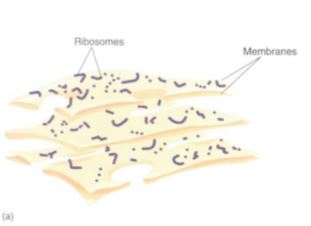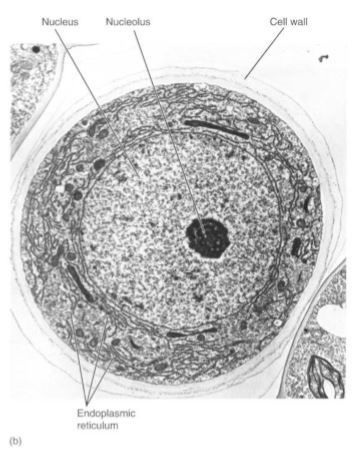


 النبات
النبات
 الحيوان
الحيوان
 الأحياء المجهرية
الأحياء المجهرية
 علم الأمراض
علم الأمراض
 التقانة الإحيائية
التقانة الإحيائية
 التقنية الحيوية المكروبية
التقنية الحيوية المكروبية
 التقنية الحياتية النانوية
التقنية الحياتية النانوية
 علم الأجنة
علم الأجنة
 الأحياء الجزيئي
الأحياء الجزيئي
 علم وظائف الأعضاء
علم وظائف الأعضاء
 الغدد
الغدد
 المضادات الحيوية
المضادات الحيوية|
Read More
Date: 23-10-2016
Date: 9-11-2016
Date: 29-10-2016
|
Ribosomes
Immersed in the protoplasm are ribosomes, particles responsible for protein synthesis (Fig. 1). They are complex aggregates of three molecules of RNA (ribosomal RNA) and about 50 types of protein that associate and form two subunits. Compared with animal cells such as those in the liver and pancreas, most plant cells synthesize little protein and have few ribosomes. However, some do produce large amounts of proteins and are rich in ribosomes, such as the protein-rich seeds of legumes like peas and beans and the cells that secrete the digestive enzymes of insectivorous plants. Each molecule of messenger RNA is long enough for six to ten ribosomes to attach to it and read it simultaneously. The ribosomes are thus bound together by the messenger RNA, forming a cluster called a polysome.


FIGURE 1: (a) Ribosomes only rarely occur free in the cytoplasm; instead, they are usually attached to membranes such as the type shown here, called endoplasmic reticulum. The amount of ribosomes attached is greater in cells that produce abundant protein (such as protein-rich seeds) or less in cells that synthesize little protein . (b) Electron micrograph of a cross-section of a hair cell that secretes protein-rich mucilage. The mucilage is synthesized in the endoplasmic reticulum, which is unusually abundant for a plant cell (X 3000).



|
|
|
|
التوتر والسرطان.. علماء يحذرون من "صلة خطيرة"
|
|
|
|
|
|
|
مرآة السيارة: مدى دقة عكسها للصورة الصحيحة
|
|
|
|
|
|
|
ضمن مؤتمر ذاكرة الألم في العراق مدير كرسي اليونسكو في جامعة الموصل يقدّم دراسةً تناقش استراتيجية الكرسي لنبذ التطرف وتعزيز ثقافة السلام
|
|
|